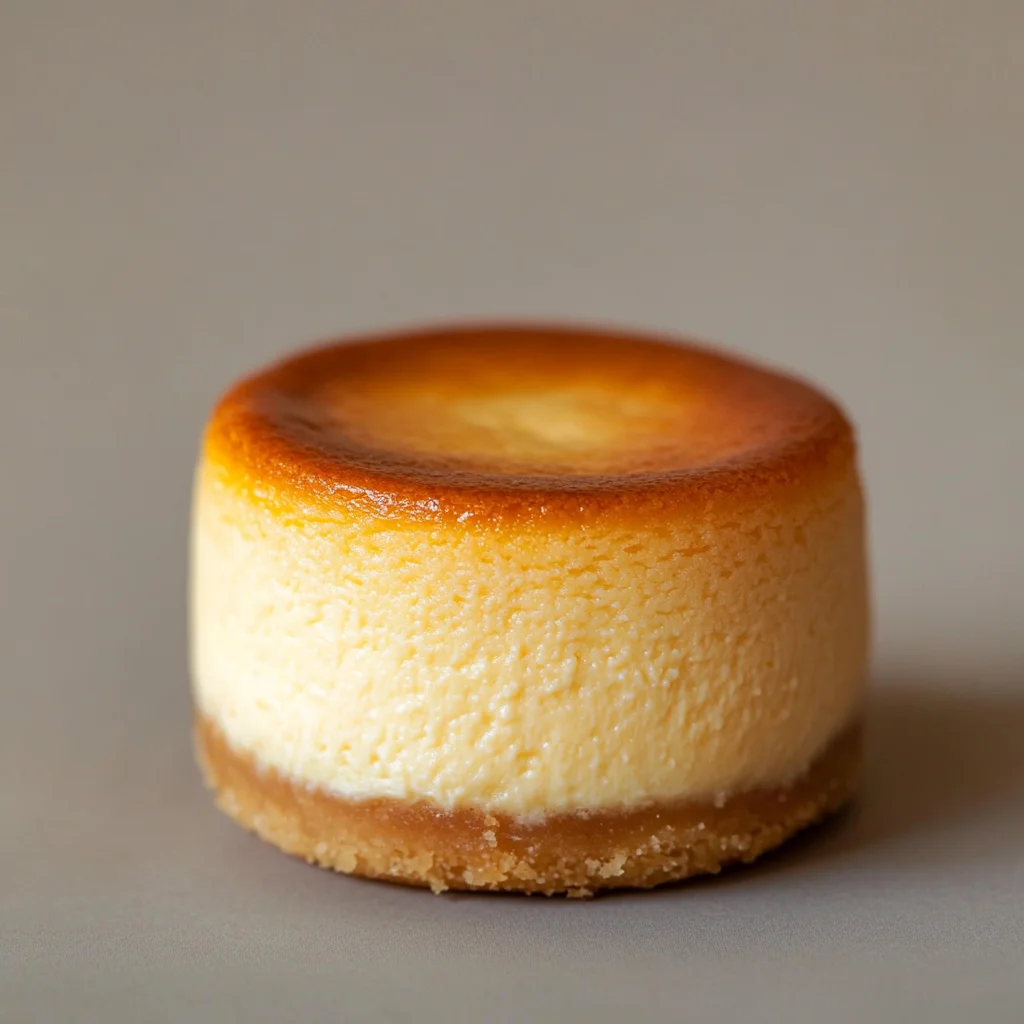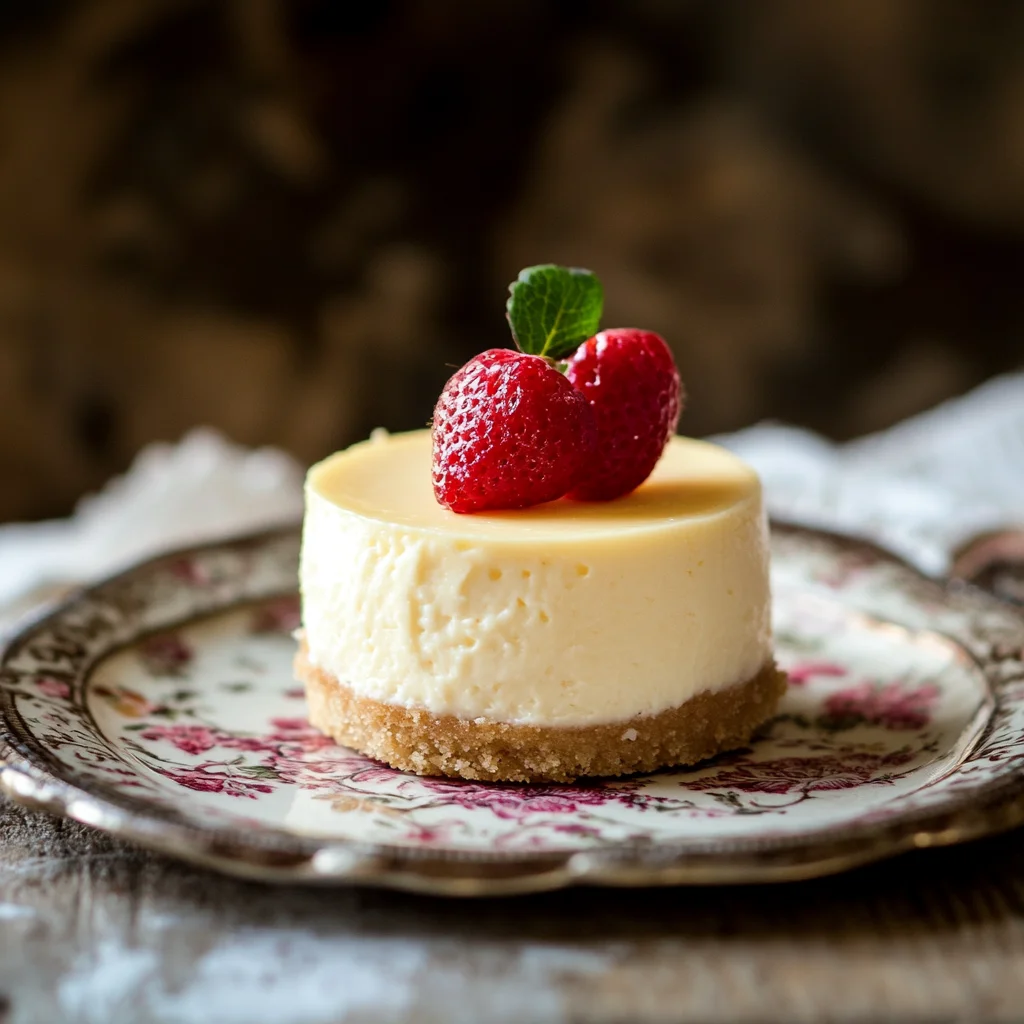Why Did My Mini Cheesecakes Collapse?
Mini cheesecakes are a perfect dessert for any occasion. Whether you’re baking them for a special event or just indulging in a personal treat, they offer a deliciously creamy texture and a satisfying, bite-sized portion. However, one of the most frustrating issues that bakers encounter is when their mini cheesecakes collapse in the middle. If you’ve ever pulled your cheesecakes out of the oven only to find them deflated or sunken, you’re not alone.
This article will break down the common reasons why mini cheesecakes collapse and provide practical tips to help you perfect your baking technique. Let’s dive in and ensure your mini cheesecakes turn out firm, beautiful, and delicious every time!
Table of Contents
Understanding the Basics of Cheesecake Structure
Before we dive into the specifics of why your mini cheesecakes might collapse, it’s important to understand how a cheesecake is meant to behave during baking. The delicate balance of ingredients, air, and temperature plays a key role in keeping your mini cheesecakes perfectly intact. By knowing the basic structure of a cheesecake, you can identify the factors that could potentially cause your mini cheesecakes to fall.
What Makes Cheesecake Rise?
To get a better grasp on the collapse issue, let’s first talk about what happens when a cheesecake bakes correctly. The main ingredient in cheesecakes is cream cheese, but it’s the batter (which includes eggs, sugar, and other components) that plays a pivotal role in how it rises. Unlike traditional cakes, which rely on flour to provide structure, cheesecakes rely on a few critical factors: air, eggs, and the right amount of moisture.
When you bake a cheesecake, the eggs in the batter act as a stabilizer. The air you mix into the batter (through stirring or beating) expands during baking, causing the cheesecake to rise slightly. However, without any structural support like flour, it can only rise so much. That’s why it’s essential to keep an eye on the air content in your batter. Too much air can cause the cheesecake to rise too quickly in the oven, which could lead to it collapsing once it cools.
Why Cheesecakes Collapse
Now that we’ve covered what makes cheesecakes rise, let’s take a look at the opposite – why do mini cheesecakes collapse? The primary culprit is usually overbaking or underbaking. Both extremes can lead to the collapse of your mini cheesecakes. When cheesecakes are underbaked, the center doesn’t have enough time to set, which causes it to collapse once cooled. On the other hand, if you overbake the cheesecake, the batter may dry out too much and crack or sink. Both scenarios lead to the dreaded sinking center that leaves your mini cheesecakes looking less than perfect.
In the next section, we’ll dig deeper into the most common causes of mini cheesecake collapse. Stay tuned!
Common Causes for Mini Cheesecake Collapse
Mini cheesecakes can be a bit tricky to bake, and there are several reasons why they might collapse. Understanding the common causes of collapse can help you pinpoint the problem and prevent it from happening again. Let’s explore the most frequent culprits behind sinking mini cheesecakes.
Over-beating the Batter
One of the top reasons why your mini cheesecakes collapse is over-beating the batter. When you beat the batter too much, you incorporate too much air into it. While a little air is necessary for your cheesecake to rise, too much can create bubbles that expand in the oven and then burst once the cheesecake cools. This leads to a collapsed center, and the texture of your cheesecake can turn out uneven and too airy.
To avoid this, it’s crucial to beat the ingredients just enough to combine them smoothly. Don’t overmix, as this can cause the cheesecake to puff up too much while baking, only to deflate afterward. A gentle mix is the key to achieving that perfect, smooth, and creamy cheesecake consistency.
Sudden Temperature Changes
Another reason for mini cheesecake collapse is sudden temperature changes. If you’re wondering why did my mini cheesecakes collapse despite following the recipe closely, it could be due to the cheesecake cooling too quickly or being exposed to drafts during or after baking. Cheesecakes need time to cool gradually, and a sudden shift in temperature can cause them to deflate or sink in the middle.
To prevent this, always let your cheesecakes cool slowly. When they’re done baking, turn off the oven and crack the oven door to let them cool for at least an hour before removing them. Once they’ve cooled, transfer them to room temperature, but avoid putting them directly in the fridge while they’re still too warm. This gradual cooling helps your cheesecakes set properly and retain their shape.
Ingredient-related Issues in Mini Cheesecake Collapse
The ingredients you use—and how you mix them—can play a huge role in whether your mini cheesecakes will collapse or stay intact. If you’ve tried everything and your cheesecakes are still sinking, it’s time to take a closer look at your ingredients and their ratios.
Too Much Liquid in the Batter
An overly wet batter can be one of the biggest reasons why your mini cheesecakes collapse. The key to a good cheesecake is a balanced consistency. If your batter has too much liquid—whether it’s from overmixing the cream cheese, using too much egg, or adding excess flavorings like fruit purées—the cheesecake won’t hold its shape properly. This excess moisture causes the cheesecake to collapse as it cools, often leaving you with a soggy and sunken center.
To avoid this, always measure your ingredients carefully. Stick to the recommended ratios of cream cheese, eggs, and sugar to ensure the proper texture. You might also want to consider straining liquid ingredients like fruit juices to reduce the moisture content.
Improper Ratio of Ingredients
Another factor to keep in mind is the ratio of ingredients. If your cheesecake recipe doesn’t have enough stabilizers, such as cream cheese or eggs, it won’t have enough structure to hold its shape while baking. This imbalance in ingredients can lead to a collapse once the cheesecake cools. Similarly, if you add too much sugar or not enough flour (in cases of certain hybrid cheesecakes), it can affect the cheesecake’s stability.
To prevent this, always follow a tried-and-true cheesecake recipe and be cautious when modifying ingredient amounts. When baking mini cheesecakes, the ingredients should work in harmony to ensure your cheesecakes are both flavorful and structurally sound.
Ingredient Issues and How They Affect Mini Cheesecake Texture

The Importance of Using Fresh Ingredients
When you’re making mini cheesecakes, the freshness of your ingredients can make a huge difference in the final product. If your ingredients aren’t fresh, especially items like cream cheese, eggs, or sour cream, you may find that your cheesecakes don’t set properly and could collapse. These ingredients need to be mixed at the right temperature, so if they are too cold or too warm, it could affect the texture and structure of your mini cheesecakes.
Common Ingredient Problems That Lead to Collapsing
Another common issue is incorrect measurements or subpar substitutions. While it’s tempting to swap one ingredient for another to suit dietary preferences or availability, doing so can lead to poor results. For example, using a low-fat version of cream cheese may lead to a runny batter, which won’t firm up properly during baking, causing your mini cheesecakes to collapse. It’s always best to follow the recipe closely and use the specified ingredients.
How Overmixing or Undermixing Affects Mini Cheesecake Texture
The Role of Mixing in Cheesecake Consistency
When making mini cheesecakes, the way you mix your ingredients matters. Overmixing your batter can lead to air bubbles being trapped inside, which, when baked, can cause cracks or collapse as the air escapes. On the other hand, undermixing can result in an uneven texture, where some parts of the cheesecake might be too dense, leading to a lack of structure and causing it to fall apart.
Mixing Tips for Perfect Mini Cheesecakes
To avoid these problems, mix your cheesecake ingredients just enough to ensure they’re well combined. If you’re using an electric mixer, be sure to mix on a low speed, and only until the ingredients are smooth. This prevents excess air from being incorporated, which is often the culprit behind collapsed mini cheesecakes. Keep in mind that cheesecake batters are meant to be thick, and too much liquid will contribute to the problem.
For more delicious recipes, check out our Strawberry Crunch Cake Recipe or How to Make Chicken Bone Broth Soup.
The Impact of Temperature on Mini Cheesecake Baking
Why Temperature Control Matters When Baking Mini Cheesecakes
One of the main reasons your mini cheesecakes may collapse is improper temperature control. This is not just about the temperature of the oven; it also includes the temperature of your ingredients and even the cooling process. Cheesecakes are sensitive desserts, and changes in temperature during baking can have a significant impact on the final texture.
When you bake your mini cheesecakes, ensure that your oven is preheated to the correct temperature. If your oven is too hot or unevenly heated, the cheesecakes can rise too quickly and then collapse once they cool down. Similarly, if the oven temperature is too low, the cheesecakes will cook unevenly and may fall apart when removed from the oven.
The Importance of Gradual Cooling
Another critical factor is how you cool your mini cheesecakes. Why did my mini cheesecakes collapse? The answer could be due to a sudden temperature change during the cooling process. A rapid shift from hot to cold can cause the cheesecakes to shrink, resulting in cracks or collapse. It’s best to turn off the oven and allow the cheesecakes to cool slowly in the oven for about an hour before transferring them to the fridge.
The Role of Baking Time and Oven Settings in Cheesecake Success
How Overbaking and Underbaking Contribute to Collapse
A crucial part of perfecting mini cheesecakes is understanding the relationship between baking time and oven settings. If your mini cheesecakes are overbaked, they can become dry, resulting in a collapse. On the flip side, underbaking can cause the cheesecakes to fall apart when they cool, as the batter may still be too runny.
It’s essential to keep a close eye on the timer and avoid opening the oven door frequently while baking. Why did my mini cheesecakes collapse? It might be because you didn’t bake them long enough, or they were exposed to temperature changes caused by opening the oven.
Perfecting Baking Time and Oven Temperature
To achieve a perfectly baked mini cheesecake, stick to the recommended time and temperature in the recipe. Use an oven thermometer to check that your oven temperature is accurate. Different ovens can run hotter or cooler than indicated, so an oven thermometer can help you avoid overheating your cheesecakes. Additionally, rotating your mini cheesecakes halfway through baking can ensure even heat distribution, preventing any uneven rise or collapse.
How Humidity and Environmental Factors Affect Mini Cheesecakes
The Impact of Humidity on Baking Mini Cheesecakes
Humidity can be an unexpected factor when it comes to why your mini cheesecakes collapse. When baking in a humid environment, the moisture in the air can affect how your cheesecake sets during the baking process. Why did my mini cheesecakes collapse? The answer may be as simple as high humidity. Moisture from the air can cause the cheesecake batter to stay too wet, preventing it from setting correctly and potentially causing it to sink or crack after cooling.
If you live in a humid area, consider baking your mini cheesecakes on dry days or using a dehumidifier in the kitchen. This can help control the level of moisture in the air and allow your cheesecakes to bake properly. Additionally, you can try adding a little more flour or cornstarch to the batter to help absorb excess moisture.
Other Environmental Factors That Can Cause Collapse
Apart from humidity, other environmental factors like altitude and air pressure can also influence how your mini cheesecakes bake. At higher altitudes, for instance, the lower air pressure can cause baked goods to rise more quickly, potentially leading to a collapse. If you’re baking at a high altitude, you might need to adjust your recipe by reducing the amount of leavening agents or increasing the baking time to compensate for the differences in air pressure.
Troubleshooting Mini Cheesecake Collapse and Prevention Tips
Tips for Preventing Mini Cheesecake Collapse
If you’ve tried everything and still wonder why did my mini cheesecakes collapse despite your efforts, here are some key tips to prevent the problem:
- Avoid Overmixing: When mixing your batter, only mix until everything is smooth. Too much air can cause the cheesecakes to rise and collapse.
- Use Room Temperature Ingredients: Cold cream cheese or eggs can create an uneven batter that may not set properly.
- Cool Gradually: Let your cheesecakes cool slowly in the oven with the door ajar, and avoid putting them directly in the fridge while they’re still hot.
Additional Pro Tips for Perfect Mini Cheesecakes
Another great tip is to use a water bath (also known as a bain-marie) when baking your mini cheesecakes. This technique involves placing the cheesecake pans in a larger pan filled with hot water, ensuring even heat distribution and preventing cracking or collapsing. It may seem like an extra step, but it can make a huge difference in the final texture and stability of your cheesecakes.
By following these troubleshooting tips and using a bit of patience, you can ensure that your mini cheesecakes come out perfectly every time, free from any unwanted collapse.

